Save Lewisham Hospital
Lewisham, London. Sat 26 Jan 2013
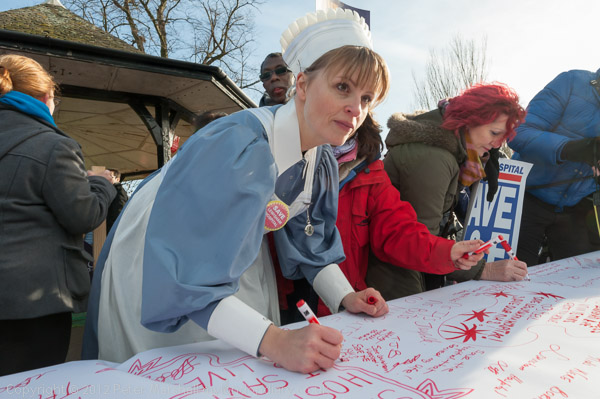
Several nurses who took part in the Olympic opening ceremony came on the march
- and signed the petition
more pictures
An estimated 25,000 people marched through Lewisham to save their hospital from closure and to protect the NHS, showing south London united against the closure on pure financial grounds of its highly succesful and much needed A&E and maternity departments.
The proposals threatening closure of the A&E and maternity services, and possibly also the the children's wards, critical care unit and emergency surgery come from the Trust Special Administrator for the South London Hospitals Trust, Matthew Kershaw, appointed by Health Secretary Andrew Lansley in July to deal with the more than £150 million loss made by the trust since it was formed in 2009.
These losses do not come from Lewisham hospital or from the current running of other hospitals in the area. Lewisham was not even a part of the body which entered into disastrous private finance schemes to build hospitals in Orpington and Woolwich before the SLHT was formed in 2009 and which saddled the new body with debts of now over £60 million a year continuing until 2032. The government at the time was warned of the problems these and other PFI schemes would cause in later years but choose to ignore the warnings, which have now turned out to be only too true.
Closure would make no financial sense - the costs involved in the closure are high and the annual savings would be relatively small and probably more than offset by increases in costs elsewhere in the system. If the government goes ahead it will be an exercise in bad book-keeping that will create a great deal of misery and cost many lives - just to make a political gesture. And it would be a gesture that may and should backfire politically.
Lewisham hospital covers a huge area of south London, with a population of around 750,000. As one of the matrons who spoke at the rally informed us, reading a letter she sent during the consultation to Matthew Kershaw, every week cases have to be sent to Lewisham from the hospitals which are supposed to be able to cope with the extra load if Lewisham closes because they cannot meet their existing workload. Several other speakers stressed that they were only here because of receiving prompt treatment at Lewisham, and that they would not have survived the at times lengthy journey to surrounding hospitals. Radio presenter Nick Ferrari told how Lewisham had saved his son - who would have died if it had been closed.
Closures such as this proposal are not connected with hospital closures because of reorganisation to improve medical services. So far the government's response to the huge protest expected at Lewisham appears to have been to try and confuse to two. There are absolutely no medical reasons for the closure of Lewisham, which is reflected in the complete solidarity of support for the campaign to keep it open by medical staff. Lewisham has received considerable investment in past years to enable it to offer an exceptional level of medical services. All of the local MPs support the campaign, as well as many other Labour, Lib-Dem and Conservative politicians from south London - and all appear to realise that the closure is simply a money-saving exercise that fails to take into consideration the needs of the population not just of Lewisham but also of the surrounding areas.
It was difficult to walk from the station to the starting point of the march a few hundred yards away because of the crush of people crowding the pavements of Lewisham. The march set off very promptly just before 12.15 going through the centre of the town, with a number of groups lining the pavement with placards or standing and clapping as it passed. It continued, mainly at a fast walking pace on past the hospital, where many workers came out to applaud and then on through side streets - where again many people came out from their houses - many of which had posters supporting the campaign - to watch and clap.
The protest was clearly larger than the earlier march to save the hospital in November, and there were more obvious supporters among community organisations, including Millwall FC, who had retimed Saturday's match to Friday evening so they could take part in the event - and the players wore the campaign t-shirts. At least one other of south London's league teams was also giving its support, as well as many other organisations in South London. Many of the placards were interactive, with a space where those carrying them could add the name of their organisation - and many had done so. Several bands took part in the march, including one that had been a part of the Olympic opening ceremony, marching with light-bulbs in their hats. As was pointed out before they came on stage at the rally, that performance had very much lauded the NHS as one of our great national strengths, so it was appropriate that they should be taking part in a march aimed at protecting it. The fight to save Lewisham Hospital isn't just a local issue, but very much a national one, with the provision of medical services that form the bedrock of the NHS under attack. If the government can close down services at Lewisham, no other successful hospital in the UK is safe in their hands.
In Mountsfield Park, the stage was set up in front of a large muddy field,
and on the way their many stopped to add their names and messages to a very
long petition sheet before venturing into the middle of the field. While perhaps
a thousand stayed to listen to the speeches - including those by two of the
local MPs, Joan Ruddock for Lewisham, Deptford and Heidi Alexander from Lewisham
East, who also spoke on behalf of Jim Dowd, medical staff and trade unionists
- rather more dispersed into less muddy parts of the park or decided to make
their way home. But most of the protesters simply had not managed to reach
the park because of the large numbers involved - the end of the march was
only just coming in as I left after around an hour.
more pictures
Anti-fascist Solidarity Against Golden Dawn
Greek Embassy, Holland Park, London. Sat 19 Jan 2013
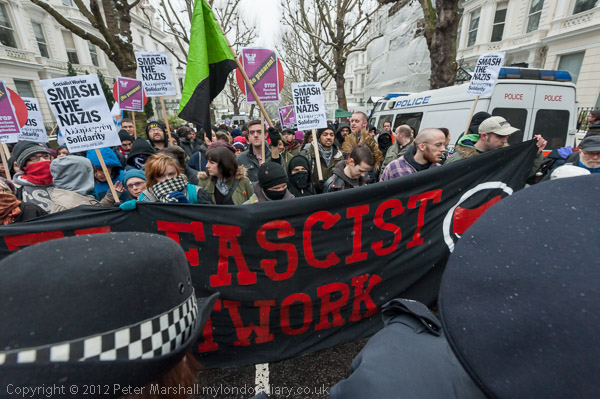
Police keep anti-fascists away from the small pro-Golden
Dawn counter-protest
more pictures
Around five hundred people gathered outside the Greek Embassy in Holland Park to protest against the fascist Golden Dawn Party in Greece and its attacks on immigrants and others there as part of an international day of action. There was a small counter-protest with 15 people organised by the 'British Friends Of Golden Dawn'.
The London protest was organised by Unite Against Fascism (UAF)at the request of Greek antifascists in solidarity with their demonstration in Athens today against the fascist Golden Dawn. Other solidarity protests were taking place around the world, including in New York, Sydney, Barcelona, Lyons, Toronto, Dublin, Vienna, Moscow, Canberra, Warsaw, Chicago, Copenhagen, Montreal, Bilbao, Milan, Finland, Slovenia, Derry, Cork, Glasgow, Edinburgh, Leeds and Bristol.
The electoral rise of Golden Dawn which got 6-9% of votes and 18 MPs in last June's Greek elections has been accompanied by a campaign of violence on Greek streets, including the racist murder of a Pakistani man, an attack on a Turkish diplomat’s car last week, an attack on a left-wing Syriza MP and on-going violent attacks on immigrants. Half of the Athens police voted for the party and little effective action is taken against these attacks and provocations in immigrant majority areas.
Unlike British right-wing parties, Golden Dawn makes not attempt to hide its admiration for Nazi ideas and regalia but flaunts them openly. Their activities have sparked outrage in Greece, and the demonstration there today under the slogan 'Athens: anti-fascist city' is backed by the city council, many other municipal authorities, trade unions, progressive politicians and parties, immigrant, Muslim and black organisations, LGBT groups, intellectuals, writers and others, a similar coalition that UAF has mobilised against the extreme right here in Britain.
Many of those groups were represented by the speakers at today's London rally, including (according to the UAF web site) Tony Benn, David Lammy MP, Jeremy Corbyn MP, Greek actor Rahil Liapopoulou, columnist Owen Jones, author and journalist Daniel Trilling, Sabby Dhalu and Weyman Bennett from UAF, Gerry Gable of Searchlight, Elizabeth Mantzari of Solidarity with the Greek resistance, Embargoed!'s Ipek Ozerim, Phyllis Opoku-Gyimah of UK Black Pride, NUS Black Students Officer Aaron Kiely, Haci Ozdemir of the Refugee Workers Cultural Association, a representative from Syriza, Andrew Burgin from Greece Solidarity Campaign and a representative of the London Turkish and Kurdish community centre Day-Mer.
Despite the snow and bitter temperatures, a sizeable crowd of perhaps 500 people turned up to show their solidarity and listen to the speeches. There was a particularly loud welcome for veteran socialist Tony Benn, who looked well but rather frail, and spoke fairly briefly, but stayed to listen to those who followed him, including David Lammy MP and the two UAF Joint Secretaries. Jeremy Corbyn MP gave a rousing speech and was followed by Varinder Singh from Sikhs Against The EDL and Gerry Gable, the editor of Searchlight, long a powerful force against racist and fascist groups.
Elizabeth Mantzari had just begun to speak when there was an uproar down the road, as some of the crowd rushed to protest against a small group of right-wing supporters of Golden Dawn, who police had brought in by bus in to a pen a short distance down the road past the embassy. The protest was organised by the 'British Friends Of Golden Dawn' and there were 15 of them, most of whom I recognised from previous EDL protests, one wearing a Union Jack mask and another with a black leather effect one, and they had brought a Greek flag and a Union Jack with the message 'English Loyalists' across it.
Confronting them were around 50 protesters who had run from the main demonstration before police had formed a line across the road and blocked the others from following. Another line of police separated these two groups, and although there was a lot of abuse, there was no violence from either side. The anti-fascists had two large banners, one in Greek and English 'Down With Fascism' another large black 'Anti-Fascist Network' banner.
Those who had been stopped further down the road also made no attempt to force their way past the police line, but contented themselves with shouting at the counter protesters and waving their placards.
I wanted to ask why as 'English Loyalists' they supported Greek Neo-Nazis, but both groups were too busy trading insults for any sensible conversation, although some of the Golden Dawn supporters did find time to insult me and accuse me of working for Searchlight - which I've never done. I don't even remember having met Gerry Gable - who I photographed earlier in the event - before.
After a few minutes, police persuaded and guided those protesting against the right wingers to move back towards the main body of the protest, and they slowly did so. After the 'English Loyalists' had been in the pen for just over 20 minutes, police had a brief word with them and then escorted them away and to the nearby tube station, followed by a slightly larger crowd still shouting insults. A few snowballs were thrown at them, but I saw no real incidents, although there was a little of a scuffle as police stopped protesters following them onto the tube.
Meanwhile the rally outside the Greek embassy was continuing, although I
had missed some of the speakers. David Lammy came back to report about the
discussion he and Weyman Bennett had been having with the officer in charge
of policing the protest, who had on reflection agreed that the opposition
should not have been assisted by the police to make their counter-protest
so close to the embassy. Bennett too made clear that this was another ignominious
defeat for right-wing racists following on from Walthamstow, and that any
further attempts to stir up trouble in London would meet with a similar huge
community response. Other speakers followed, including one on behalf of the
left-wing Greek party Syriza and Owen Jones on his usual forceful and amusing
form, before the rally finished after the planned hour and a half - certainly
long enough to be standing around in today's weather. The protest was a success
for the UAF, and yet another humiliation for the extreme right.
more pictures
'Stand with Brad' at US Embassy
Grosvenor Square, London. Wed 16 Jan 2013
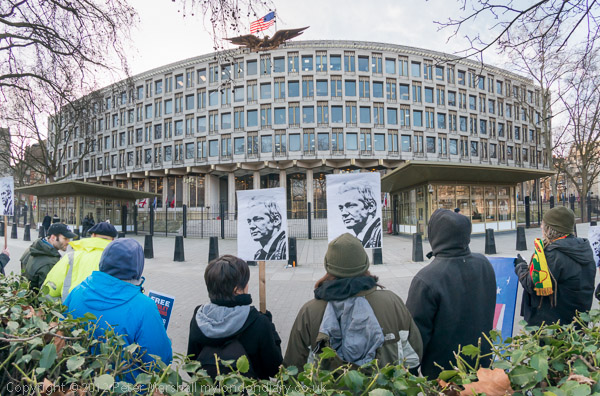
Protesters support Bradley Manning and Julian Assange
in a vigil at the US embassy
more pictures
A vigil of solidarity with Bradley Manning played the soundtrack of the video 'Collateral Murder' outside the US Embassy on day 963 of his pretrial detention while his defence argued in court for charges to be dismissed for lack of a 'speedy trial.'
Protesters, including members of 'Veterans for Peace', gathered outside the embassy in Grosvenor Square and stood silently in line holding placards calling for Bradley Manning to be freed. Some of the placards said that whistle blowing was not a crime, and the protesters stood in silence while the audio of 'Collateral Murder', a 45 minute video allegedly leaked by Manning to Wikileaks was played. The video clearly shows US forces committing war crimes and has become a symbol of the need for Wikileaks and 'for courageous whistleblowers like Bradley Manning.'
A statement from the group reads:
'As we stand facing the Eagle, we are telling the powers perpetuating this ‘asymmetric warfare’ that we have not forgotten the things that have been revealed to us, the things that they hoped to keep under wraps: we will still out lies.
We are showing our respect and gratitude by standing in solidarity with Brad, the one now in the dock for standing for truth and justice, and reminding the authorities that we oppose their persecution of him.'
The protest was one of a series organised by WISE Up Action. a Solidarity
Network for Bradley Manning and Julian Assange, and similar events are held
on other occasions when Manning appears in court at Fort Meade. On the reverse
of many of the placards was a picture of Julian Assange, and after the vigil
at the US embassy the group was planning to go on to take part in the daily
vigil it organises every afternoon outside the Ecuadorian embassy were Assange
is still surrounded under threat of arrest if he leaves.
more pictures
Stop Psychiatry Drugging Kids
Royal Courts of Justice, London. Wed 16 Jan 2013
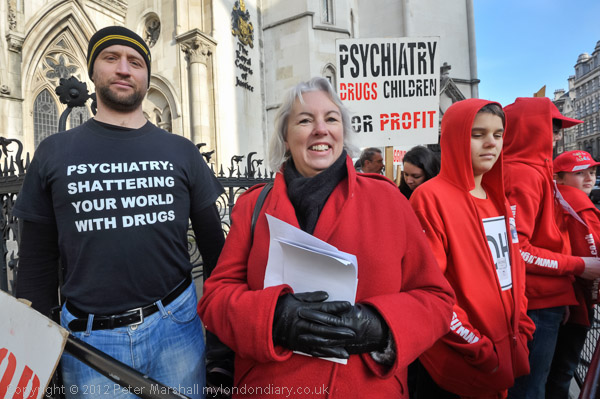 The
Citizens Commission on Human Rights, a Scientology front group, protests against
psychiatry
The
Citizens Commission on Human Rights, a Scientology front group, protests against
psychiatry
more pictures
The Citizens Commission on Human Rights (United Kingdom) protested at the High Court today against a child who has never been diagnosed with any mental illness being dosed with a dangerous anti-psychotic drug prescribed by a psychiatrist.
The Citizens Commission on Human Rights (CCHR) is described on Wikimedia as 'a Scientology front group which campaigns against psychiatry and psychiatrists' and was established in 1969 by the Church of Scientology. Its UK branch describes itself as "one of a number of nonprofit mental health watchdogs, responsible for helping to enact more than 150 laws protecting individuals from abusive or coercive practices" and goes on to state: "CCHR has long fought to restore basic human rights to the field of mental health, including, but not limited to, full informed consent regarding the medical legitimacy of psychiatric diagnosis, the risks of psychiatric treatments, the right to all available medical alternatives, and the right to refuse any treatment considered harmful."
Many would agree with at least some of the statements that the CCHR makes about the unscientific nature of much psychiatry, and also of the harm that can be caused by the labelling of people, particularly children, as suffering from various mental disorders. And it is indisputable that the pharmceutical industry makes rich profits from the treatment of often non-existent conditions, and that patients, including children, are often drugged into comatose submission as an easy solution to difficult or challenging behaviour. But it seems unfair to dismiss all of psychiatry as their banner did as 'Junk Science and Dangerous Drugs' and I find it impossible from personal experience to deny the existence of medical conditions such as depression - or to dismiss the utility of some drugs in the treatment of mental conditions.
But it is hard not to be concerned about the human rights abuses of Scientology, and difficult to regard seriously its statments about junk science when it associates itself with products such as ASEA. The man in a white coat at the protest holding the pill bottles which were described as redundant and unscientific told me about, and I looked it up on the web. It soon became clear that it was an unscientific scam, promoted by dubious means. ASEA is pure salt in pure water. So at least in small quantities it won't do any harm except to your wallet, but as a qualified chemist I can certify the description of its magical constitution as scientific nonsense. As the web site 'Science-Based Medicine concludes: "The only value of the product is the entertainment value that can be derived from reading the imaginative pseudoscientific explanations they have dreamed up to sell it."
Much of the actual information about the case they were protesting about
heard at the Royal Courts of Justice today is confidential, but available
of course to the court, which I understand backed their case, although the
matter has to be confirmed by the family court. The court thought it was a
good case, and from what little I heard I think the court was right. It was
a lively protest with kids labelled with various disorders, a number of well-worn
placards and a lively little dog - I think called Paddy - that attracted photographers
and was lifted high into the air when the court's decision was heard.
more pictures
Equality Protest Against ATOS Work Assessments
Royal Courts of Justice, London. Wed 16 Jan 2013
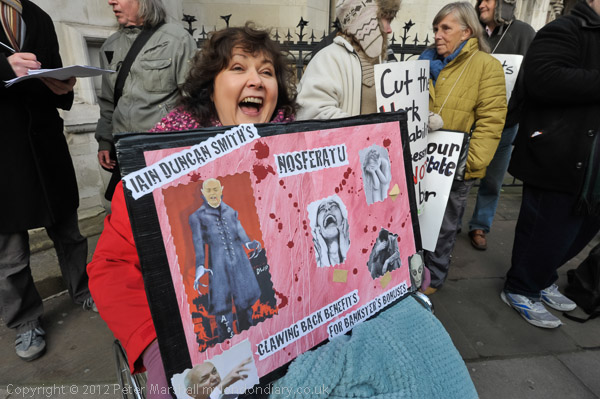
Iain Duncan Smith's Nosferatu - Clawing Back Benefits
for Bankster's Bonuses
more pictures
Disabled activists held a vigil at the Royal Courts of Justice as a tribunal heard a judicial review of Work Capablility Assessments on the grounds they violate the Equality Act, not being accessible for those with mental health conditions.
The protesters included a number of disabled people, with a few in wheelchairs, but more who have mental health conditions, along with a number of pensioners, trade unionists from the court branch of the PCS and other supporters. They stood outside the court with placards and banners and held a rally at which many of those present spoke. The speakers reminded us of the special problems with the Work Capability Assessments (WCAs) for many with mental health conditions, as these are often spasmodic, which may result in claimants on a good day not seeming very ill and on a bad day being unable to attend an assessment - which results in them being automatically judged fit for work. They stressed that few of those carrying out the tests had sufficient knowledge and experience in the area of mental health to be able to sensibly conduct the assessment, and called for medical records to always be presented and used in the assessments.
The protest stressed the criticisms made of the testing procedure by MPs and doctors through the BMA as well as by campaigners and independent reports made for the Dept of Work & Pensions. As their press release stated:
'Dozens of disabled people are dying every week following assessment. Nearly 40% of those who appeal the decision to remove benefits have the decision overturned, meaning thousands of people are wrongly being put through a traumatic and harrowing experience needlessly. The governments own appointed assessor of the policy has ruled it ‘unfit for purpose’... This would not be acceptable in any other government contract, yet goes without comment or sanction by this government. No-one is called to account, no-one takes responsibility.'
Pussy Riot London Solidarity Demonstration
Russian Embassy, Kensington, London. Wed 16 Jan 2013
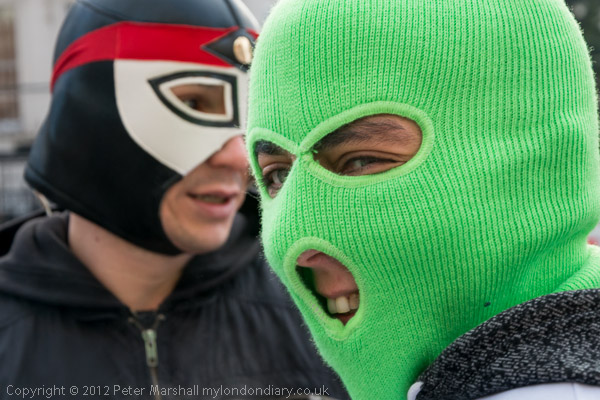
Most of the protesters had brought hoods or masks like
those worn by Pussy Riot
more pictures
Protests opposite the Russian Embassy took part in an International Day of Solidarity with Maria Alyokhina, attending a court hearing today over her plea for her sentence to be suspended so she can raise her son until he is 14.
Three members of the Russian punk band Pussy Riot were sentenced for their performance of an anti-Putin "punk anthem" in a Moscow Orthodox cathedral in February. Yekaterina Samutsevich was released in October having been given a suspended sentence, but Maria Alyokhina and Nadezhda Tolokonnikova were sent to prison camps in some of the Soviet Unions harshest areas. Alyokhina is severing her two years in Perm in Siberia, where the court hearing is taking place.
Protests around the world, including in Argentina, Australia, France, Czech Republic, several cities in Germany, Italy, Sweden and in both Moscow and St Petersburg were taking place today.
It was a bitter morning in London, and traffic in some areas were disrupted
by a major accident early in the rush hour, and protesters were slow to arrive
opposite the Russian Embassy in Kensington. It was perhaps a mistake to call
a three hour protest, and some people who arrived took a brief look and then
went off elsewhere, intending to come back later. For some time there was
only a single protester in the pen, but others began slowly to drift along
in ones and twos. There were still only a handful when I had to leave for
another protest, but more were expected to arrive later, particularly around
lunchtime.
more pictures
Guantánamo - 11 Years of Illegal Detention
US Embassy, London. Fri 11 Jan 2013
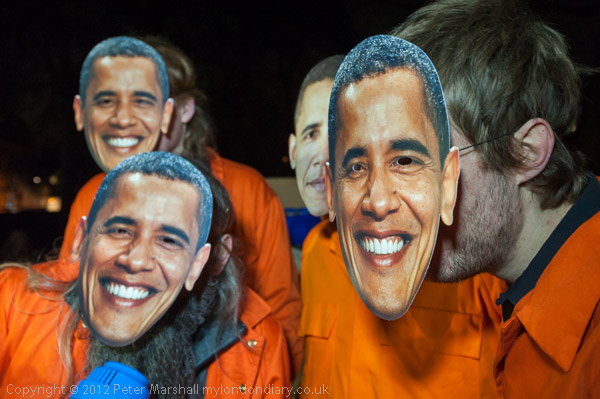
Obamas abounded, and there were large posters of his
broken pledges over Guantanamo
more pictures
11 Years of illegal detention at the US military prison camp of Guantánamo Bay was marked by a candlelit vigil outside the US Embassy in London.
The protest on the 11th anniversary of the setting up of the camp came just a week before the inauguration of President Obama for a second term as US President. The closure of Guantanamo was a key election pledge when he first stood, but he has failed to do so. There are still 166 prisoners held there, and only 72 have been released despite many more having been cleared for release.
Protesters, some wearing orange jumpsuits, came to the US embassy in the early evening for a candle-lit vigil. There were a number with 'Obama' face masks as well as one or two wearing the masks of detainees.
The protesters lit a long line of candles (though perhaps it never quite made it to 166) set out on the pavement in front of the US Embassy in Grosvenor Square and then lined up along the tall embassy fence behind them. Inside the compound, armed police watched. The protesters held up a number of quotes from President Obama containing his promises to close down the illegal prison camp at Guantanamo. Others held posters and banners calling for the camp to be shut down and prisoners like Shaker Aamer, the last Londoner there, to be set free.
Following this sheets were handed out to the line of protesters each with
the number and name of a detainee. These were then read out in turn going
along the line, with each name being followed by everyone shouting 'Present'
as if a register was being called.
more pictures
Rendition Routes to Guantanamo
Knightsbridge & Belgrave Square, London. Fri 11 Jan 2011
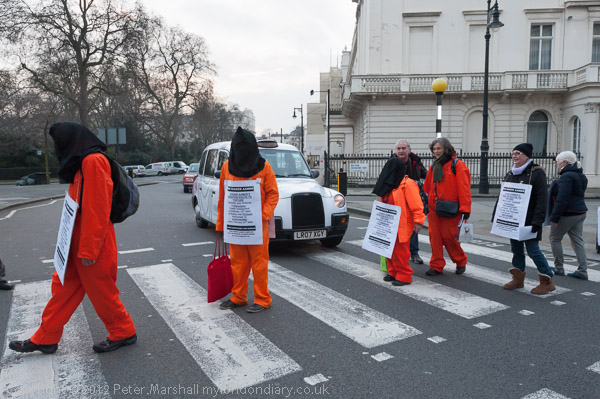
I thought of Abbey Road, but wanted it to be a bit different
more pictures
On the 11th anniversary of the illegal US prison camp at Guantanamo bay, four walks in London mirrored the route taken by detainees including Shaker Aamer, calling in turn at the embassies of countries who colluded in his illegal rendition.
The protest on the 11th anniversary of the setting up of the camp came just a week before the inauguration of President Obama for his second term as US President. The closure of Guantanamo was a key and often repeated election pledge when he stood for his first term, but in office he has failed to keep his promise. Although 72 prisoners have been released, there are still 166 men held there, many of whom have actually been cleared for release, some more than five years ago.
Guided walks in the afternoon traced the journeys of five men to Guantanamo, each calling at the various embassies that facilitated the rendition of one of them to the detention camp (two had followed the same route.) The men included Shaker Aamer, a British resident still held despite being cleared for release in 2007, whose family, including a ten-year old son born shortly after his capture who has yet to see his father, live in Battersea, and another former British resident, Ahmed Belbacha. He was also cleared for release in 2007, and although he has been offered housing in Bournemouth where he worked for several years and in Amherst, MA, but both UK or US governments are opposed to accepting him. The UK regard him as a failed asylum seeker as he lost his UK appeal asylum appeal in 2002 when he failed to appear at the the hearing when he was already held in Guantanamo. The US want to deport him to Algeria, where also in his absence he has been tried and sentenced to 20 years jail, thought to be for his speaking out about the inhumane treatment he would be subjected to if returned there.
The other walks were for child soldier Omar Khadr, a Canadian captured as a fifteen year old fighting in Afghanistan and now held in a Canadian maximum security jail after conviction by a military tribunal, torture victim Abd El-Rahim Al-Nashiri currently on trial at Guantanamo, and Adnan Farhan Abdul Latif, a Yemeni prisoner who died in Guantanamo last September, eight years after he had been cleared for release during the Bush presidency. His death serves to confirm the suspicion of many that the US authorities intend to hang on to some of the prisoners until they die - and hastening their deaths by continued daily mistreatment.
I was photographing elsewhere when the walks began and it wasn't easy to make contact with them as the walk leaders were not answering their phones. Eventually I met up with the group of just over a dozen, four of them in orange jump suits, tracing the embassies of countries involved in the illegal rendition of Shaker Aamer. They had started at the Afghanistan embassy and when I met them in Knightsbridge were on their way to the Turkish embassy.
The orange boiler suits, posters and black hoods attracted considerable attention as they walked slowly through the busy street of shops, shouting about the illegal detention of Shaker Aaamer, handing out leaflets and calling for support. But as we got closer to the embassy, passing several other embassies on the way, the streets were largely deserted.
A police officer outside the Turkish embassy asked the protesters to move to a pen on the opposite side of the wide road around Belgrave Square, but they decided first to try and deliver a letter to the Ambassador. Another officer arrived and went inside the embassy to enquire if they would accept the letter, taking in one of the flyers about Shaker Aamer. Unfortunately he came out a few minutes later to tell them that the embassy was not prepared to accept hand-delivered letters and that they should post it normally.
A short distance away at the Portuguese embassy the protest was treated differently, with a charming man coming outside and listening briefly before taking the letter. The protesters then held a short rally outside the embassy, talking about Shaker Aamer, the last Londoner in Guatanamo, and the forthcoming demonstration in Parliament Square on 13th Febraury when he will have been held there for 11 years. Aamer, a charity worker, is still held over five years after being cleared for release, and campaigners believe this is because of the embarrassment his testimony would give to both US and UK governments, with further evidence of UK collusion in torture.
In the letter to the ambassadors of Afghanistan, Turkey and Portugal, the Save Shaker Aamer campaign states:
Your country secretly permitted use of your air-space and facilities to the CIA on February 13 2002 in contravention of international border controls and agreements...You agreed to ask no questions, make no record and suspend routine inspections. Had you inspected the flight, you would have found Shaker Aamer and other prisoners chained together, in boiler suits, hoods, ear muffs and nappies. They had been drugged and forbidden to speak. Armed guards stood over them.
I left the group as they were on there way to the US Embassy for a further
protest there.
more pictures
Assange Supporters Continue Embassy Vigil
Ecuadorian Embassy, London. Fri 11 Jan 2011
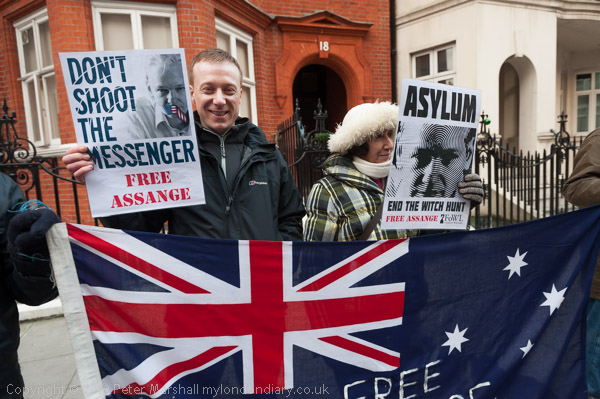
Don't shoot the messenger - Free Assange
more pictures
Supporters of Julian Assange continue a regular protest at the Ecuadorian embassy which he is living. Among them were supporters of 'Women Against Rape' who do not want him extradited to face rape charges they say are political.
Although Assange has now been inside the embassy for over 200 days and press frenzy has largely abated, a small groups of supporters continue a daily vigil opposite; there were eight when I arrived in mid-afternoon and half a dozen came as I was leaving. One of those I talked to told me that he came several times a week when he could fit it in with his work. There was a large Australian flag with the message 'Free Assange' and the same text with comments such as 'Don't Shoot the Messenger' on posters that they held. To one side was a large banner from 'Collateral Murder', a web page showing videos about the indiscriminate slaying of over a dozen people in the Iraqi suburb of New Baghdad -- including two Reuters news staff. Wikileaks released a classified militiary video of this in 2010, and Private Bradley Manning is accused of making it available to them.
At the vigil I was handed a flyer from 'Women Against Rape' reproducing a
Guardian Article from 23 Sugust 2012 in which they make state that 'The judicial
process has been corrupted' and that the pressure to extradite Assange is
a part of a political clampdown against Wikileaks. The write: 'Once again
women's fury and frustration at the prevelance of rape and other violence
is being used by politicians to advance their own purposes... this time to
facilitate Assange's extradition or even rendition to the US'.
more pictures
BBC Ignores Palestinian Hunger Strikes
Broadcasting House, Portland Place, London. Fri 11 Jan 2013
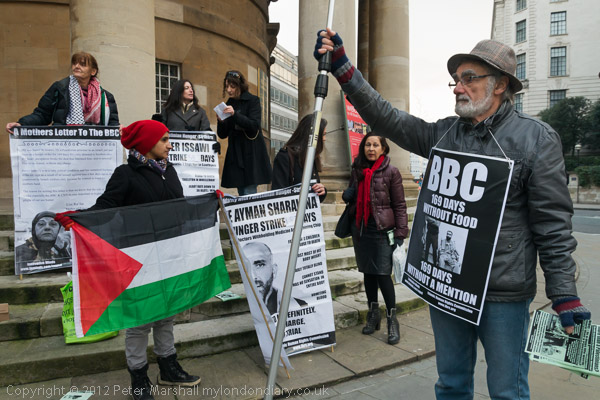
The protest was small but raised the important issue of BBC bias
more pictures
The Palestinian Prisoners Campaign protested at the BBC in London complaining at BBC bias in failing to cover the hunger strikes by Palestinian political prisoners Samer Al-Issawi and Ayman Sharawna and brutal attacks by Israeli guards.
Samer Al-Issawi, a Palestinian held in an Israel prison without charge or trial has been on hunger strike for over 160 days. Three weeks ago, a brutal attack by Israeli guards on this wheelchair-bound virtual skeleton in an Israeli courthouse with a judge standing by which broke several of his ribs was captured on video and made available to the media. Another prisoner, Ayman Sharawna, suspended his hunger strike for a week after six months, but has now resumed. Despite the length of these protests, the seriousness of the men's condition and the newsworthy attack, the Palestinian Prisoner Campaign (PPC) complain that the BBC has failed to make any mention of them in the 21 million articles on the BBC web site.
The PPC contrast this with the coverage given to Israeli corporal Gilad Shalit since his release in an internationally brokered deal in October 2011, who is mentioned in over 50 articles from 2012. They say the two hunger strikers are among those who were covered by the deal to release Shalit but that Israel reneged on the deal after Shalit was released.
The protest was by a small group, but expressed the feeling of many who have posted about the failure of the BBC to report the issue on Facebook and other online media. Among the several large posters they displayed was one of including a letter from the mother of Samer Al-Issawi, appealing to the BBC to publicise the plight of her son. In it she says he is in a 'very critical condition ... as a result of an assault on him a few days ago in the courtroom by Israeli soldiers only because he wanted to touch his mothers hand.'
Another poster compared two stories - 'Abandoned Dog Recovering After losing 1/2 Body Weight', and 'Palestinian Political Prisoner Samer Issawi on Hunger Strike 169 Days, On Verge Of Death After Loosing More Than 1/2 Body Weight' and asks the question 'BBC -is a dogs life worth more than a Palestinians?' because it was only the first of these stories that made the news. Whatever people feel about the Palestinian cause, it seems a disturbing reflection on the BBC's sense of priorities.
The protesters stood largely in silence facing the iconic building of Broadcasting
House and its less imposing large recent extension. The BBC had put some ropes
with security men in front of the large yard in front of the new extension
and a sign saying it was private property and only those with passes would
be admitted, and the police were obviously prepared for a larger protest.
Many of those entering and leaving the BBC came over to read the placards
and take the leaflets, and some were obviously sympathetic to what appears
to be a BBC bias, and one mentioned the banning of the Disasters Emergency
Committee for Gaza in January 2009 as another example of this - a decision
that was widely criticised by BBC staff, with the Today programme giving Tony
Benn the opening to 'hijack' an interview and make the appeal despite the
ban.
more pictures
De-List Vedanta from London
Berkeley St, Mayfair, London. Fri 11 Jan 2013
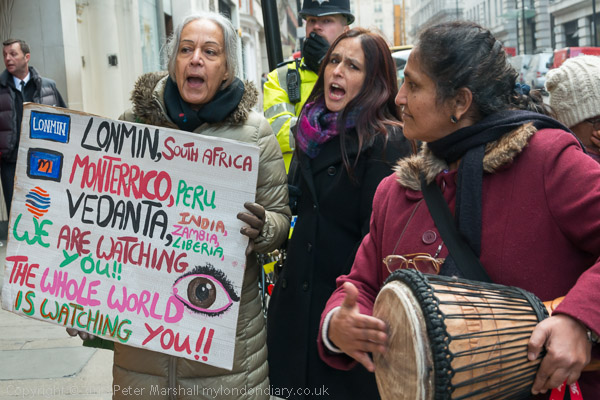
Protesters let Vedanta know "The whole world is watching you!!"
more pictures
A noise demonstration picketed the UK HQ of Vedanta Aluminium calling for the mining company to be de-listed by the Financial Conduct Authority because of its worldwide record of environmental destruction, corruption and human rights abuse.
Vedanta is a London-based mining company founded by billionaire Anil Agarwal and owned by him and his family through various tax havens. It's listing on the London FTSE 100 gives it what former CBI director Richard Lambert has called 'a cloak of respectability', allowing it to access 'lots of passive investors' despite 'challenging the canons of corporate government.'
Vedanta's activities in India and Africa have led to protests by people around the world. In Odisha, its bauxite mining and aluminium smelting have displaced over 10,000 people and ruined large areas of fertile land; their attempt to mine hills sacred to the indigenous population have so far been prevented for seven years by mass protests and legal actions, with a Supreme Court ruling expected shortly on whether mining can go ahead despite the "inalienable rights" of the indigenous population.
Vedanta's Goa subsidiary has been accused of large scale fraud and illegal mining, and there have been major floods of mine waste, including the drowning of a whole village in toxic waster. Their subsidiary Sterlite in Tamil Nadu has violated environmental conditions and expanded its operations without consent. A toxic gas leak in 1997 led to mass protests - with over 1500 people being arrested for taking part. Deaths of workers have been wrongly recorded as suicides and damning decisions by courts and pollution control boards and experts have been reversed, leading to allegations of large scale corruption and bribery.
Also in Tamil Nadu, Vedanta continue to mine in the Koli Hills for ten years after their permission ran out before local protests by affected villagers and activist petitions managed to halt it in 2008; the abandoned mines continue to pollute water supplies and local villages.
At Chhattisgarh in Korba after Vedanta bought a aluminium plant in 2001 they slashed wages and sacked many unionised workers. After a chimney collapse in which the company claim 42 workers were killed, they quickly bulldozed the rubble and between 60-100 workers are missing, assumed to have been buried in the rubble.
Vedanta also has interests in other areas of the world, and is supported by the UK government through both the Department for International Development (DFID) and the Department of Trade and Industry (DTI). The government has also helped them through the World Bank and by the personal intervention of David Cameron who put pressure on the Indian government to force through a deal giving Vedanta 30% of India's crude oil at a knock-down price.
The protest outside Vedanta's London office took place on the street outside the building where they occupy a suite on an upper floor, and was a noisy but peaceful affair with a large number of banners and placards listing some of Vedanta's crimes around the world. It started with a group of around a dozen but soon grew to around 50, including Japanese anti-nuclear protesters as Vedanta is also involved with nuclear power in India.
Police ensured that the protesters did not block the entrance to the offices, shared with several other companies, and security men from the offices stood and watched the protest. Many of those going in an out of the building and passing along the street took the leaflets the protesters were handing out giving details of Vedanta's activities and of the support they get from the UK Government, and some stopped to talk with protesters.
The worldwide campaign against the illegal activities of Vedanta has had some success, with several large investors having sold their investments in the company because of its ecological and human rights crimes. The protesters hope more will do so, and one of the main aims of today's protest was to but pressure on the new Financial Conduct Authority to investigate and de-list the company.
They also call for Vedanta's CEO Anil Agarwal, one of the richest people
in Britain to be brought to justice. As well as the crimes of Vedanta they
also claim he and the company are closely linked to the extremist Hindu right
groups responsible for genocidal attacks on minority Muslim and Christian
communities in some Indian states.
more pictures
Parliament Square Hunger Strike
Parliament Square, Westminster, London. Thu 10 Jan 2013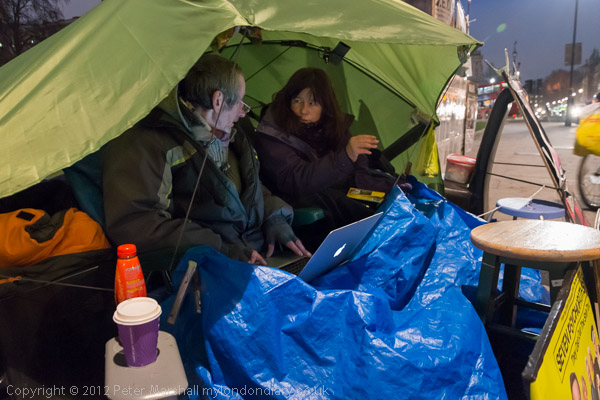
Barbara under an umbrella in Parliament Square on day
15 of her hunger strike
more pictures
Peace campaigner Barbara Tucker is now on the 15th day of her hunger strike in Parliament Square, almost a year since police took away her shelter on Jan 16th 2002, continuing the campaign begun by the late Brian Haw on 2 June 2001.
I visited the peace campaign briefly while Barbara Tucker who looked and sounded well was working on an urgent deadline for an article about the peace campaign with one of her supporters. They were sitting under a large umbrella with blankets and many layers of clothing writing on a Mac. Even the umbrella has been taken away from them on various occasions, but has been returned. It was dark and just a degree or two above freezing.
Tucker has now been protesting on the pavement here for over seven years, continuously apart from two spells in prison and over 47 arrests for her protests. She hopes that her hunger strike will shame the British Government into action, and in an interview with PressTV says that she will continue for as long as it takes - even if it means slowly dying in front of Parliament, although as she wrote when 5 days after beginning the hunger strike "I did not come to Parliament Square to die and I do not want to die. I came to Parliament Square because people everywhere are entitled to - live - in peace, without the constant illegal wars being waged by government."
In her statement issued on 31 December, Tucker complains about the failure of the Westminster council and the police to either prosecute her or return the property they took away a year ago. The campaign also complains about repeated harassment by the police and 'heritage wardens', and on the campaign web site witness statements are reproduced that show that wardens report when she is seen sleeping so that police may come and harass her. Under the The Police Reform and Social Responsibility Act 2011 using sleeping equipment to sleep overnight in the square is an offence, but they have taken away her 'sleeping equipment', and sleeping in itself is not a crime.
The statement points out that the restrictions and their over-zealous and unlawful application are an attempt "to hasten a break down of the human immune system, which placed under constant stress, fighting the elements, will mean we go or die" and that "It is illegal for the state to make their endangering of life a condition of our Freedom of Expression."
Tucker writes: "I know with certainty that even I, am very unlikely to survive another winter without our tents, and so I have taken the serious step of beginning a hunger strike. This is not something I have ever done in seven years of peacefully campaigning here.
The purpose of my hunger strike on the doorstep of government, where we campaign, is to highlight to government their injustice in not returning our tents which are necessary for our survival as we peacefully exercise our right to Freedom of Expression now."
Brian Haw's health deteriorated markedly over his almost ten years in Parliament
Square, and he also smoked more heavily. Although his death on 18 June 2011
was from lung cancer, his ten years of protest and the frequent and repeated
harassment undoubtedly hastened his decline and death.
more pictures
Gang Rape Protest at Indian High Commission
Aldwych, London. Monday 7 Jan 2013
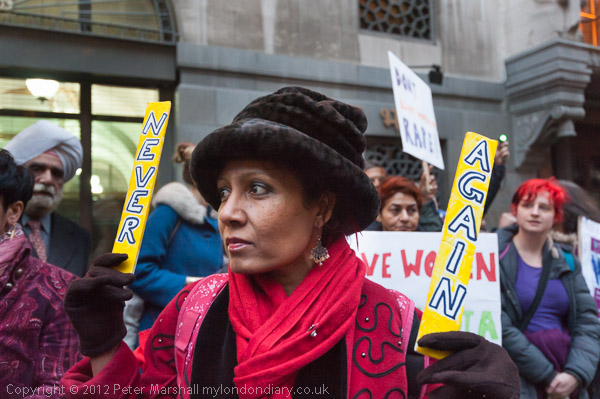
'Never Again' held up by a woman outside the Indian
High Commission
more pictures
Around a thousand people crowded the pavement outside the Indian High Commission in a protest against Indian attitudes to rape and violence to women led by Southall Black Sisters following the gang rape and death of Jyoti Singh Pandey.
People crowded the pavement outside the Indian High Commission this evening to protest against the gang rape of the young medical student on a Delhi bus that led to her death a few days ago in a Singapore hospital. There were far more than police had planned for, and they spilled dangerously out into the busy road at Aldwych - at least one lane needed to have been protected by cones for safety. The majority of those present were women, many of them Indian, but there were many others.
As Southall Black Women stated when they called for the protest, shocking though the attack on Jyoti was, "this is only one of many acts of horrific sexual violence that take place everywhere and every day in India. The world’s largest democracy was named the worst country in the G20 countries for violence against women (after Saudi Arabia) in the recent Trust Law/Reuters Survey. This is the heart of darkness in 'India shining'. By drawing worldwide attention to this horror and solidarity for Indian women, we hope to shame the Indian government into acting now by making public spaces safe for women, starting with implementing the laws and bringing the perpetrators to justice."
Of course as was made clear at the protest, violence against women is endemic around the world, and among the protesters were those from women's projects and refuges in London and elsewhere in England. But India unfortunately stands out for the attitudes to women generally and by the police and courts in particular. The protest was a show of solidarity for the demands of Indian feminists, in particular for:
- Increased patrolling and deployment of police, including police women in public places so that such incidents can be prevented, and women’s safety assured; improved infrastructure to make cities safer for women.
- Fast track courts to deal with rape cases, hearings to be held on a day to day basis, so that sentence can be delivered within a period of 6 months. Police investigation to be conducted in a time bound manner.
- Standardized investigation procedures to be circulated to all police stations, with action taken against police personnel who do not implement them properly;
- Increased sensitization, effective investigation and accountability of the police in dealing with heinous crimes against women.
- Immediate relief, legal and medical assistance, and long term rehabilitation measures to be provided to survivors of rape, without delays and hassles.
People were still arriving to swell the numbers at the noisy protest when
I left.
more pictures
Epiphany Rising Against King Remembered
Swan Alley to St Paul's Cathedral, London. Sun 6 Jan 2013
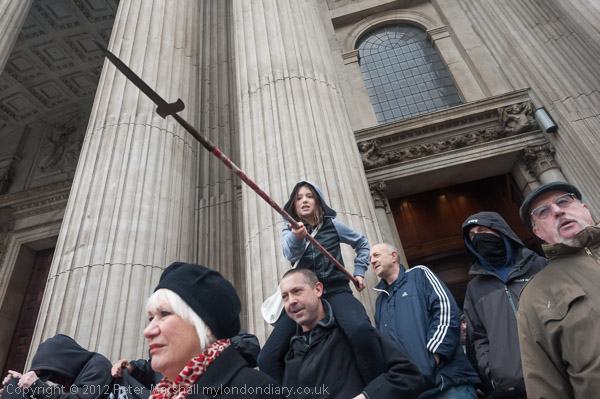
Venner broke into St Pauls with an armed gang, but the
re-enactment merely posed for photographs
more pictures
The bloody armed insurrection by Thomas Venner and fellow Fifth Monarchists standing up heroically against the re-imposition of the monarchy at Epiphany in 1661 was remembered today in a re-enactment walk following the route of his uprising.
The Fifth Monarchists were an important religious movement in England during the rule of Oliver Cromwell, seeing the execution of King Charles as being part of the fulfulment of the Biblical prophesy in the book of Daniel about the end of the four kingdoms of history being followed by the "rule of a son of man" for a thousand years (which they took as the rule by the Pope) after which would come the Christ's reign on earth. For this to happen, the old order had to be ended by violence - as had begun with the beheading of the king.
They included three of those who had signed the execution warrant, but they soon become disillusioned with Cromwell, who they saw as trying to make himself a king and they began to agitate against him. Thomas Venner was imprisoned for several years for plotting to overthrow Cromwell, but released when Richard Cromwell became Protector.
They were incensed by the restoration of the monarchy, and in particular by the savagery shown by the new order against the 'regicides', including Fifth Monarchist Major-General Harrison who showed great bravery during his gruesome public execution by hanging, drawing and quartering.
Venner, a popular lay preacher and one of the most radical of the group, led a congregation at Swan Alley (now Great Swan Alley) in the north of the City of London, and at the start of 1661 he lead a group of around 50 men (and some women) from there to attack key points in the city of London with the battle cry "King Jesus and the heads upon the gates". For four days they held various parts of the city and fought off attempts to stop them, but then were met by a large force from the army. They took refuge in a pub in Coleman St and continued to fight for several hours until all were either killed or captured. Venner, who had earlier killed three men with his halberd in Threadneedle St nad been wounded 19 times before he was overpowered.
After a brief trial at the Old Bailey, and along with ten others he was sentenced to be hung, drawn and quartered; the sentence was carried out in front of the meeting place of his congregation in Swan Yard on 19 Jan 1661. Although many other Fifth Monarchists who had taken no part in the rising were hunted down and hung or imprisoned, and draconian laws were enacted against dissenters this did not end the movement.
Around 25 people, including a number of figures well-known on the anarchist and radical left, met at the site of Venner's death to remember these radicals who lived and died for their beliefs in a more egalitarian society. Among them with his young daughter was the grandson of Philip Sidney Noakes, the last of the Muggletonians who died in 1979. They were another egalitarian dissenting sect which began around 1651, but unlike the Fifth Monarchists, were pacifists.
Ian Bone, one of the organisers of the event, gave a detailed account of the events of 1661, and together with other speakers stressed the continuity between these seventeenth century figures and modern radicalism despite the religious frame of thought through which they saw the world and perforce expressed their views.
The group set off following the route that the rebels had taken in 1661 along Swan Alley and into Coleman St, and like them were led by a young woman holding a pike. A very fine banner with the text 'Who Shall Rouse Him Up' was behind her, and there were other banners including that of Bristol Class War, and 'Rioters Reunited', used at the 20th anniversary of the more recent Poll Tax riots, as well as an anti-workfare banner carried by a group in black with face masks, who also had red and black anarchist flags. On the route the marchers shouted some of the old slogans, 'King Jesus', 'Heads On Pikes' and 'Nobility In Chains'. A few carried weapons - axes and a pike - as props for the filming, and there were frequent stops to allow the camera to get into position to film the next stage.
They looked impressive running behind the banner into Guildhall Yard, but
contented themselves with standing in front of the doors, waving weapons and
fists and shouting slogans - rather than storming the building 1661 style
- before taking off for another rampage towards the camera down King St. They
even folded up the banner to walk through New Change (now a shopping centre)
rather than risk upsetting the shoppers, before finally rushing up the steps
of St Pauls, where rather than breaking in like Venner they simply stood on
the steps for photographs before deciding it was time to pack up and go to
the pub.
more pictures
Northfleet & Southfleet
Northfleet, Southfleet and Gravesend, Kent. Tue 1 Jan 2013
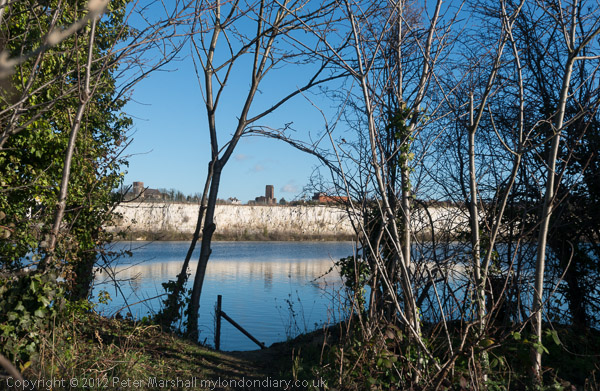 Blue
Lake, Northfleet - with Northfleet churches above former quarry face.
Blue
Lake, Northfleet - with Northfleet churches above former quarry face.
more pictures
I first photographed around Northfleet in the 1980s when the cement industry was still going full-tilt, with some of the huge chalk quarries still being worked and a great deal of industry, some already derelict, along the banks of the River Thames. I returned to the area occasionally and in 2000-2001 made an extensive series of panoramic images, including one of this lake, which is included in my next book, 'Thamesgate Panoramas 2000-2001'. By this time things had begun to change dramatically - including in one former quarry the huge Bluewater shopping complex (also in the book.) A few years later I was back around here again, as part of a project on both sides of the river around the Channel Tunnel rail link and further developments.
The area is still changing, and the huge cement plant I photographed between the main road and the Thames has disappeared, replaced at the moment mainly by empty mud and a railhead for spoil from Crosslink which is being shipped out to form a bird reserve on Wallasea island, raising its overall level by 2m.
Today was a family walk, which tends for a route march rather than my normal photographic derives, and we made our way down from Northfleet station to the parish church and then along the footpath over the railway line, cursed the detour around the high speed link and continued down past the back of Springhead Enterprise Estate, finally found the re-routed footpath to the back of Pepper Hill Sainsbury's and then over the A2 and two branches of the high speed rail line before taking a very muddy track across fields to Southfleet, where we ate lunch on a seat in the churchyard.
From there we took a slightly roundabout route vaguely eastwards along minor
roads and paths, going through Istead Rise (it did, very steeply) to meet
the Wealdway within site of Ifield Court, taking it north to Gravesend. There
was a very tedious mile or so of road from the A2 into Gravesend, but the
town is more interesting and we reached the Thames as evening fell before
making our way to the station and catching the train home. I was told we had
only done about eleven miles but it felt an awful lot more.
more pictures
top of page
All pictures on this section of the site are Copyright © Peter Marshall 2012; to buy prints or for permission to reproduce pictures or to comment on this site, or for any other questions, contact me.

